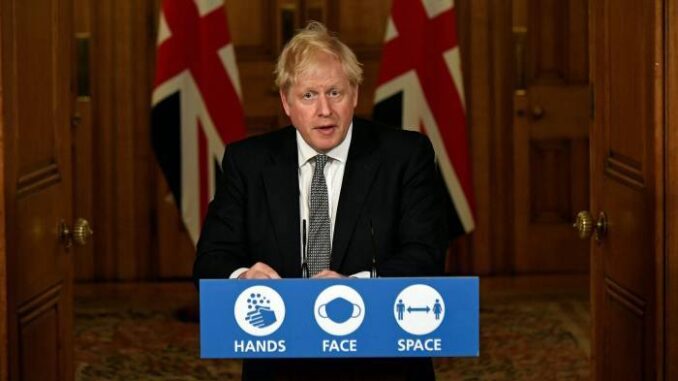
On the 31st October 2020, the prime minster announced that England would once again come under a national lockdown for coronavirus five and half weeks after this was first recommended by the government’s own Special Advisory Group for Emergencies (SAGE). Over that period of dithering, daily new cases of Covid-19 infection increased from 4,964 to 21,915, hospital in patient cases from 1,502 to 10,000 and deaths from 28 to 326. Scientists, campaigners and many members of the public expressed anger and amazement at the slow response by ministers and their delay in taking decisive action. Exclusion of schools from the lockdown is now causing concern to both parents and teachers, with the National Education Union (NEU) alarmed by evidence of surging infection among pupils calling for them to be closed.
Fatal slowness – lessons not learned
On the 30th January 2020, having considered the situation in China, the World Health Organisation declared Covid-19 a Public Health Emergency of International Concern. Such a declaration equates to an assessment of a situation as:
‘serious, unusual, or unexpected; carries implications for public health beyond the affected State’s border; and may require immediate international action’.
The following day, a team of scientists at the University of Hong Kong recommended that:
‘Draconian measures that limit population mobility should be seriously and immediately considered, as should strategies to drastically reduce within-population contact rates through cancellation of mass gatherings, school closures, and instituting working from home . . . .preparedness plans should be readied for deployment at short notice, including securing supply chains of pharmaceuticals, personal protective equipment, hospital supplies, and the necessary human resources.'
The same day, the first cases of Covid-19 were identified in the UK. We must not forget that the Westminster government then chose not to heed these warnings, consistently underestimated the risks involved and dragged its feet in making important decisions. This has lead to the UK having the highest death toll in Europe, and provides an urgent and compelling basis to call for an immediate inquiry into the handling of the pandemic so that lessons can be learned and put to use.
No convincing exit strategy
There is no end to the pandemic in sight. A vaccine might become available and might be effective, but only time will tell. Some Conservative politicians
such as John Redwood have become medical experts, feeling able to advise the ‘Today’ programme on BBC Radio 4 that new treatments had changed the outlook for patients. He is, however, appropriately more guarded on his website,
mentioning only the role of steroids and requesting information from ministers on other drug trials. Steroid treatment in critically ill patients on a breathing machine has been shown to decrease the risk of death by a third, but this is small comfort if the number of very sick patients requiring intensive care exceeds the number of beds available. Trials of other drugs have been disappointing so far, with a number of agents including the much touted Remdesevir showing no effect on improving survival. NHS England claim overall improvements in management of patients has produced a modest increase in survival for those needing life support, from 72% to 85%.
Serco and the failed privatised ‘test and trace’
Astonishingly, Redwood makes no criticism of the disastrous and privatised national ‘test and trace’ system, which recently had it worst week ever, reaching only just over 60% of its target 80% of contacts. Of course, all contacts reached should also self isolate, but in reality only around 1 in 5 do so because ‘support’ is not integral to the ‘test and trace’ strategy, as it should be. Serco’s hopeless management of the whole system continues to beggar belief, and now includes the fact that untrained 18 year olds were magically transformed from level 3 call handlers to level 2 clinical contact caseworkers – a position previously reserved largely for qualified doctors. The predictable consequences were described as “a shit show” by one of the distressed employees. Serco claimed it was acting on instructions from the Department of Health and Social Care, which confirmed this was indeed the case.
For Redwood to acknowledge the incompetence of Serco would be an admission that contracting out to a private sector provider is not in fact a guarantee of success, something conservative ideologues find impossible to concede. How much further evidence is required to open the eyes of those who will not see? Most recently, the contract for operation and development of the UK’s nuclear weapons is being taken back into public management after criticism by the National Audit Office of the hundreds of million of pounds being wasted, one of the companies involved being Serco!
Close the schools – support the NEU
School is vitally important for children and loss of educational opportunities may have devastating long term consequences in terms of life chances. Conversely, there are risks of increased community viral transmission when schools are open. Risk reduction and an increase in distance learning should be part of the ongoing Covid-19 management plan. School reopening after the first lockdown was not supposed to happen until the number of new Covid-19 cases had been driven down to a very low level, and an efficient ‘test and trace’ system was in place. Both of these commitments were abandoned by a government obsessed with playing down Covid’s threat to our health while constantly highlighting its potential to cause economic harm. Sadly, the government’s commitment to children’s education and the ‘levelling up’ agenda can be gauged by the fact it has recently slashed funding allocation for laptops to disadvantaged families by 80% as well as its refusal to continue to provide free school meals during the holidays for children from low income families.
Managing risk in schools
Preconditions that should have been observed for schools to re-open were set out by Independent SAGE:
- drive community transmission down to low levels
- wear masks in secondary schools
- additional teachers and spaces and smaller class sizes so that social distancing is feasible
- monitoring of ventilation (given aerosol spread in classrooms)
- provide resources necessary for study at home
- clear guidance regarding when to get tested and what to do about isolation
- local testing with rapid turnaround of results.
We now have a situation where in one week over half a million people were infected, with the highest rates in teenagers and young adults and the most steep rise in school children. The overriding risk factors for spreading infection are known to be closed spaces with poor ventilation, mingling in crowds and settings where there is close contact (a good description of schools!). To be serious about driving down infection once again, schools must be closed and only re-opened when the above preconditions have been met; an urgent task for the Department for Education.
Back to basics – we must have a public test, trace and support system
With cooperation from the public, a second national lockdown is likely to be effective in driving down numbers of cases once again, however, there is no point going back to the previous situation and repeating the exponential increase in cases that followed the ending of the first lockdown. Together with increased surveillance at borders and quarantine for travellers, an effective ‘find, test, trace, isolate and support’ system as outlined by Independent SAGE is the only thing that is likely to make a major difference. This should also incorporate ‘backward’ contact tracing (not being done in the UK at present) where the origin of infection is sought in order to find those super-spreaders – the 10% of people who cause 80% of infections.
The fact that the current privatised system will not and cannot work effectively has not yet been recognised by the government despite all the evidence. Until this issue is grasped and an effective local public health system put in place, we are doomed to repeat cycles of rising infection followed by lockdown with disastrous consequences for both health and the economy. Just as the provision of clean drinking water and sewerage in the 19th century was ushered in only when hundreds of thousands of cholera deaths spread from poor to rich communities, perhaps it is only a grotesquely rising death toll that will prompt decisive action? In the light of what we already know, this would not only represent more criminal foot dragging, but further highlight the callous disregard of this government for its people and their wellbeing.
This article was written by Keep Our NHS Public's co-chair John Puntis.







Why are the Government still using Deloitte, Serco and others earning £7,000 per day when centres like Chessington in Surrey hardly ever seem to be open to take samples making residents travel hundreds of miles to another centre to be tested?